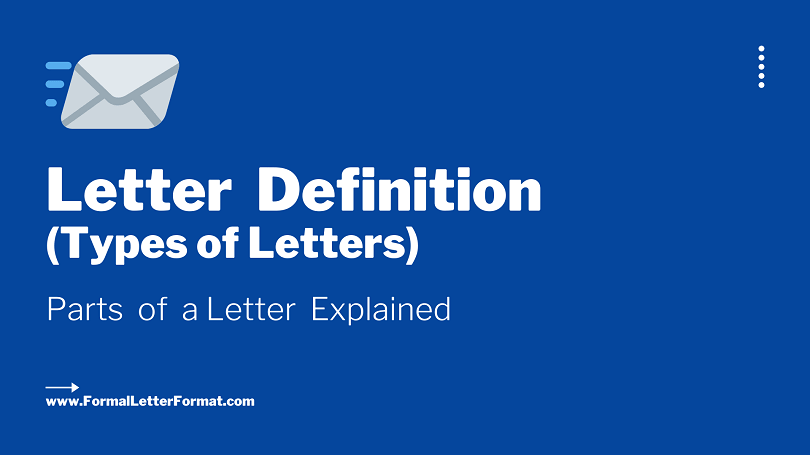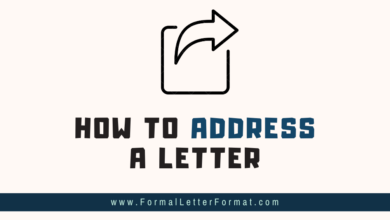Letters – Kinds of Letters: Formal and Informal Letters Format: Letter Writing Guidance as per Situations with Examples
Letter Writing Instructions on Informal and Formal Letters and Pointers for Informal and Formal Letters

The letter is defined as containing a source of information, message, invitation, notice, warning, complaint, data, or communication, dispatched in an envelope by postal service or sent via an encrypted email service provider. There are two kinds of letters; formal and informal letters.
In the past people used to send the hardcopy of letters to one another for the purpose of communication. For example, if you wanted to invite friends to a party then you would have to write a letter to your friends. Or for the business communication purpose people also used to send the letters to one another. However, this is still done today as formal letters are still very common. In this article, we will discuss everything about the letters and their format. So, let’s have a look as follows.
Letters
Letters are used for communication. They are written from one individual to another so the message can be conveyed in a written form. Moreover, you can convey any message such as you can give an invitation, can do personal communication, inquire about something, can write a professional complaint, can ask for a job, etc. Letters are of two types.
- Informal letters
- Formal letters
#1 Informal Letters
Informal letters are usually the ones that are written in an informal context such as to the relatives or any familiar person you know. The informal letters are very easy to write and are very conventional ones. You can do personal communication through them. Additionally, you can use the informal tone and flowery words but it shouldn’t mean that you use the careless words.
Format of Informal letter:
For writing an informal letter you need to follow a specific format which contains the following elements listed as follows:
- Writer’s address
- Date
- Salutation/Greetings
- Letter body containing all the content
- Conclusion
- Sender/writer signature
#2 Formal Letters
Formal letters are those which are written in the professional or official context. The letter style is very formal, clear and very precise. These letters are written for business inquiry, job application, editorial purpose, etc. Additionally, this must be kept in mind that formal letters must be very factual and concise.
Format of Formal Letter:
Before the format of a formal letter is discussed let us tell that person who is writing a letter is known as a sender or a writer. On the other hand, the person to whom letter addresses is known as a receiver or an Addressee.
Anyhow, formal letters must follow a specific format containing the following listed elements which are as follows:
- Writer Address
- Date
- Designation/ Name of receiver
- Receiver Address
- Salutation/Greeting
- Subject
- Letter body containing the content
- Conclusion
- Complimentary Close
- Sender’s Signature/Name
- Sender Designation
Parts of a Letter (Explained)
Now let’s discuss the details of all the parts of a letter.
#1 Writer’s Address
On the left side of the page, you must write the writer’s address in full detail.
#2 Date
After the writers’ address, you have to pen down the date on which letter is written. It is important to write the date because it helps in keeping the record for how long the communication between to parties is going on. For writing the date any of the formats could be used.
#3 Salutation
You have to write greetings or salutation in a very polite way to the receiver. You must use words like ‘Dear Mam/Sir’ or you can also use words like ‘Respected Mam/Sir’.
#4 Subject
The subject is very important in the formal letter as it gives a very precise and clear view of the purpose of writing a letter. You have to write the subject after the date and must underline it.
#5 Letter Body
Letter body is a major part of the letter as in this section you have to provide details of the letter. The body can be divided into 3 paragraphs such as the introduction, major content, and conclusion.
-
- Introduction:
In the first paragraph, you have to give an introduction. The introduction should be very brief and must give a quick idea about the matter.
-
- Main Content:
In the second paragraph, you have to write all of the details of writing the letter. It must tell all the inquiries, placements, and other matters.
-
- Conclusion:
Lastly, in the third paragraph, you have to conclude the letter in a good way. You have to write about your expectations, demands, anticipations, etc. You should write words like ‘with regards’ or ‘Thanking you’, etc.
#6 Complimentary Close
Before you pen down your signature you must write complimentary close. It shows respect which you give to another person. You can write words such as
- Yours respectfully
- Yours sincerely
- With thanks
- With regards
Tips to Write a Formal letter
- Write in a proper format for a letter.
- You must write the introduction very clearly.
- Use simple language and be formal.
- Write factual and concise information
- Use proper punctuation, grammar, and, the correct spellings.
- Write in a polite way and use gentle, courteous words.
- To make the letter look clean you must leave the lines between the paragraphs.
- Make sure your letter is very unambiguous and clear, providing all the necessary details.
